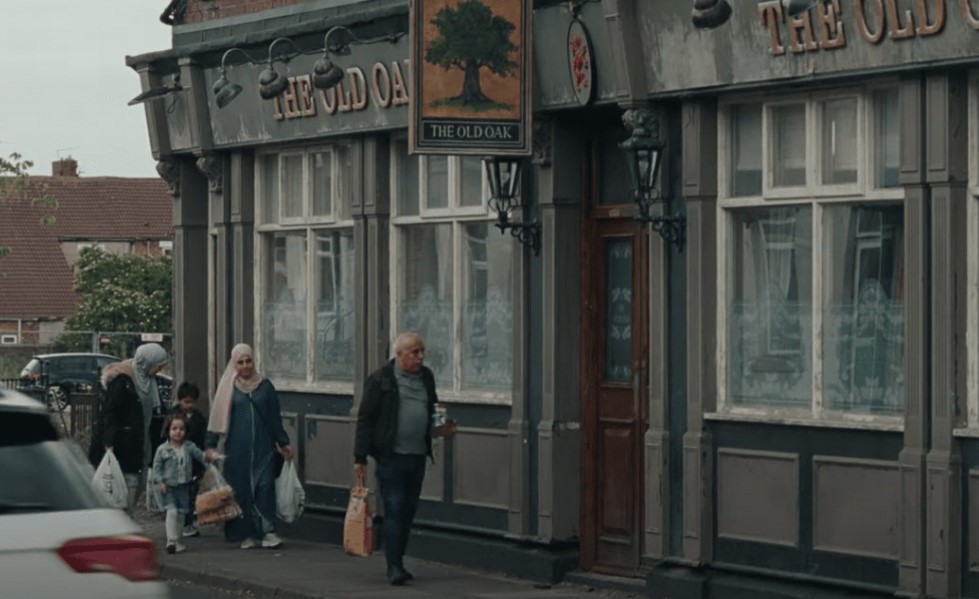Ray Goodspeed reviews The Old Oak.
On Sunday, I went to see the latest, and possibly the last, film by the legendary director Ken Loach. It deals with the settling of Syrian refugee families into a deprived and neglected ex-pit village in County Durham.
The film focusses on the central characters of Yara, a Syrian woman refugee who is a photographer, and TJ, the landlord of a run-down and tatty village pub, The Old Oak, that is barely surviving. Their friendship and their relationships (good, bad and very ugly) with those around them from both communities, form the main drivers of the narrative.
Has there ever been such a consistent amplifier of the voices of all that is best in working class people and their communities than Loach? For close to six decades including both historical or contemporary themes, set in Britain or internationally, he has reflected the problems and the tragedies of ordinary people but also their resistance, resilience and humour. And he has done so by respecting the dignity of his subjects, never slipping into lazy caricatures or crass stereotypes.
He certainly doesn’t sugar coat reality, nor shy away from negative attitudes and this could not be clearer than in “The Old Oak”. He gives full rein to characters to express opinions and prejudices that are shocking, delivered in a naturalistic, maybe improvised, style of acting which Loach encourages his actors to use. From the hostility and aggression which meets the Syrians’ first arrival, to subsequent chats in the pub, the hatred and visceral resentment of some villagers towards the newcomers is convincing and frightening.

Yet he doesn’t allow those attitudes to represent the entire host community, as some liberal commentators might claim and some right-wingers hope for. There is misunderstanding and suspicion, sure, but there are also feelings of fairness and decency among some of the other men, women and children of the village and a residual echo of previous trade union battles and solidarity.
Class politics
However, the key ingredient of Loach’s films, one that informs his understanding of his subjects and sets him apart from most other film-makers, is his profound grasp of class politics. In the hands on another director, this film could have been a simple story of good versus evil, poor refugees fleeing war and torture versus racist and xenophobic white people.
Make no mistake – there are some vile characters, and other characters who are confused and weak who go along with them. But Loach is careful to place the whole conflict in the context of a small community that has been ruined by decades of neo-liberalism (aka capitalism) and austerity – de-industrialised, neglected and partly derelict. Some families in the village face destitution and genuine hunger. They are trapped in a declining community that is impossible to leave due to the collapse in property prices. Early in the film, three small terraced houses are bought at auction by a property company for £8,000 each, ready to let at exorbitant private rents.
In such circumstances, it is the easiest thing in the world to set these people against the newcomers, when even the bare minimum they are provided with on arrival is actually more than some existing residents are able to get. Add in poison from the press, inflammatory social media and deliberate malicious misinformation and the toxic mixture is ready to go.

It is the task of the two main characters, TJ and Yara, to try to overcome all that. Yes, of course, they appeal to people’s compassion and humanity and try to push back against the prejudices, but most importantly, they also work together, in solidarity, not charity, to try to resolve the difficulties faced by the community as a whole. I am not going to spoil the film, so you will have watch it to find out how successful they are.
The plight of the Syrian refugees themselves, their past horrors at the hands of the Assad regime, and their ongoing trauma, is set out with delicacy and empathy, but their hospitality, hope and resilience in the face of such disaster is nicely drawn.
Unbearably moving
I found sections of the film unbearably poignant and moving. I cried often – more at the happy bits than the sad or bad ones. The acting performances were really impressive, particularly from the two main leads, Dave Turner as TJ and Ebla Mari as Yara, but also from a host of supporting characters – including the vile ones! And Loach is adept at getting touching performances from child actors. The work of Loach’s collaborator, Paul Laverty, also deserves a mention for the subtle and nuanced script.
The semi-improvised, naturalistic acting style in Loach’s films can, on occasion, feel just a little bit flat or awkward, but at no time did I feel that in this one. The dialogue was believable at all times, and even the set-piece, more political, monologues that Loach and Laverty bravely give characters rang true to my ear. I have met and spoken to characters like this and they struck me as very real. Indeed, a couple of the cameo performances were from non-actors that I actually know – lefties from the County Durham socialist movement! Well done to them!
I have to mention the irony that production of “The Old Oak” is part-funded by the BBC. A little extra bit of rank hypocrisy from that illustrious body, given their shameless smearing of Loach. It is also funded by several other channels throughout Europe. They know a genius when they see one. Loach has won the Palme d’Or at Cannes – twice! – and was nominated again this time.
This film deals with really difficult issues facing working class and refugee communities without pandering one bit to hatred and prejudice, but also avoids simplistic stereotypes or purely liberal hand-wringing. I think it is one of Ken Loach’s best films. If this does, indeed, turn out to be his last one, as he has said (and he is 87), then it is a marvellous way to finish a stunning career.



